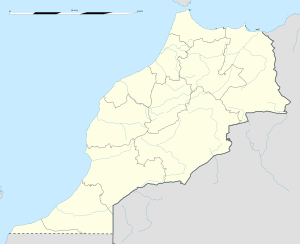Capture of the Rif (1792)
| Capture of the Rif | |||||||
|---|---|---|---|---|---|---|---|
| Part of the Conflicts between the Regency of Algiers and Morocco | |||||||
| |||||||
| Belligerents | |||||||
|
| |||||||
| Commanders and leaders | |||||||
|
|
| ||||||
The Capture of the Rif took place in 1792 and was orchestrated by the Bey of Oran, Mohammed el-Kebir, to capture the eastern Rif region in northern Morocco.
Background
[edit]Since the late 17th century the Algerians were able to gain possession and recognition of sovereignty over a portion of eastern Morocco around Oujda, initially after a set of victories against the Moroccan Sultan Ismail Ibn Sharif in engagements such as the Battle of Moulouya and the Siege of Oran, in which the Deylik of Algiers and Spain cooperated against Morocco.[1][2][3] Upon the proclamation of the Moroccan Sultan Moulay Slimane, the Bey of Oran Mohammed el-Kebier, after succeeding in liberating Oran from Spanish occupation, crossed into Moroccan territory under the pretext of preparing the siege of Melilla. Later developments proved, however, that the siege of this fortress was but a cover for the territorial ambitions of the Bey.[4]
Capture
[edit]In 1792 the Algerians managed to conquer and take control of the eastern Rif region in Morocco.[5][6] The Bey of Oran then withdrew to Algeria as soon as he had appointed his qaids for the eastern provinces.[4]
Aftermath
[edit]Between 1795 and 1798 the Algerians abandoned the eastern Rif region along with the eastern part of Morocco that they had reigned over just before the arrival of a military expedition that was sent by the 'Alawi Sultan Slimane to re-capture these regions.[7] The Bey of Oran put up no resistance, and with the capture of the region in 1795,[8] the border between the Regency of Algiers and Morocco was definitively fixed at Wadi Kiss.[9][10][11][12] which brought an end to the conflicts between the Algerians and Moroccans.[13]
References
[edit]- ^ Present-day Morocco - Osmund Hornby WarneAllen & Unwin, 1937 - Morocco - Pg 237
- ^ Bulletin économique et social du Maroc, Volume 21, Issues 73-76 Société d'études économiques, sociales, et statistiques, 1957 - Morocco - Pg 74
- ^ Martinière, Maximilien Antoine Cyprien Henri Poisson de La; Lacroix, Napoléon (1894). Documents pour servir à l'étude du Nord Ouest africain: réunis et rédigés par ordre de M. Jules Cambon (in French). Gouvernement général de l'Algérie, Service des affaires indigènes.
- ^ a b El Mansour, Mohamed (1981). Political and Social Developments in Morocco During the Reign of Mawlay Sulayman 1792-1822 (PDF). p. 210.
- ^ Morocco in the Reign of Mawlay Sulayman - Mohamed El Mansour Middle East & North African Studies Press, 1990 - Morocco - 248 pages: Pg 104
- ^ Boyer, Pierre. "Contribution à l'étude de la politique religieuse des Turcs dans la Régence d'Alger (XVIe-XIXe siècles)." Revue des mondes musulmans et de la Méditerranée 1, no. 1 (1966): 11-49. p.35. “Le Bey de l'Ouest, Mohammed el-Kebir, rétablit la situation et pénètre même en territoire marocain, prenant Oujda et poussant jusqu'au Rif.”
- ^ Pennell, Richard (November 1991). "Mawlay Sulayman - Morocco in the Reign of Mawlay Sulayman. By Mohammed El Mansour. Wisbech, England: Middle East & North African Studies Press, 1990. Pp. xiv+248. £28". The Journal of African History. 32 (3): 526–527. doi:10.1017/s0021853700031649. ISSN 0021-8537. S2CID 162845698.
- ^ "OUJDA". Encyclopaedia of Islam, First Edition (1913-1936). doi:10.1163/2214-871x_ei1_sim_3585. Retrieved 2021-05-16.
- ^ Chenntouf et UNESCO 1999, p. 191-206
- ^ Schroeter, Daniel J.; Katan, Yvette (1996). "Oujda, une ville frontière du Maroc (1907-1956): Musulmans, Juifs et Chrétiens en milieu colonial. Histoire et Perspectives Méditerranéennes". Revue Canadienne des Études Africaines. 30 (2): 295. doi:10.2307/485177. ISSN 0008-3968. JSTOR 485177.
- ^ Cour, Auguste,. (2016). L'établissement des dynasties des Chérifs au Maroc et leur rivalité avec les Turcs de la Régence d'Alger. Saint-Denis: Editions Bouchène. ISBN 978-2-912946-78-2. OCLC 1153443505.
{{cite book}}: CS1 maint: multiple names: authors list (link) - ^ Chenntouf, Tayeb (1981). "L'évolution du travail en Algérie au XIXe siècle". Revue de l'Occident musulman et de la Méditerranée (in French). 31 (1). PERSEE Program: 85–103. doi:10.3406/remmm.1981.1906. ISSN 0035-1474.
- ^ Morocco in the Reign of Mawlay Sulayman - Mohamed El Mansour Middle East & North African Studies Press, 1990 - Morocco - 248 pages: Pg 104

